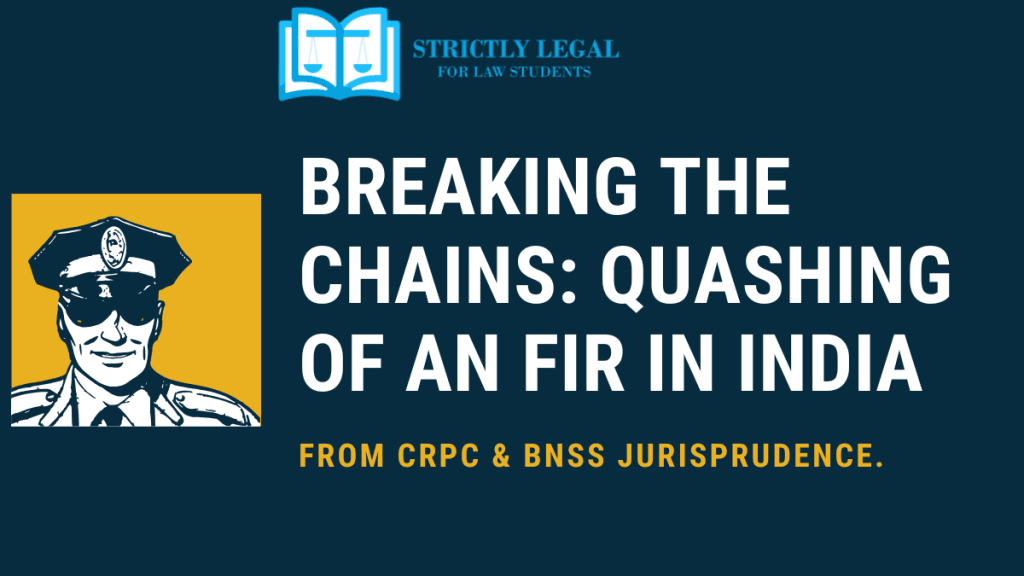The First Information Report or FIR is a crucial document in the criminal justice system in India. It act as the formal notification to law enforcement agencies, specifically the police, about the commission of cognizable offences (an offence where a police officer has the authority to arrest without a warrant and to begin an investigation with or without the consent of the magistrate; examples being Murder, Rape, Kidnapping etc.). FIR is the very first and quintessential step in initiating the investigation process and laying the foundation for any sort of legal action. When an FIR is filed, the criminal prosecution and the trial process steps into the shoes towards finding justice. Under Section 154 CrPC (now S. 173 BNSS), Section 153(3) CrPC (now S. 175 BNSS), or Section 200/202 CrPC a victim or complainant may file an FIR or a formal complaint.
Table of Contents
Framework of FIR under the Code of Criminal Procedure, 1973
The FIR is governed primarily under S. 154 , Code of Criminal Procedure, 1973 (CrPC), which predominantly mandates that whenever a police officer receives the information regarding the commission of a cognizable offence, they must record the information in writing i.e., known as the First Information Report, which shall be recorded at the Police Station and in case the informant is unlearned or ignorant the officer is responsible to record the information verbatim. Upon Recording the informant must be provided with a copy of the FIR without any costs being demanded, which corroborates transparency and enables the informant to track the progress of the investigation.
In case where the police officer/ officer in-charge refuses or denies to register the complaint or file the FIR after receiving the information regarding a cognizable offence, the informant has all due rights to approach the higher authorities (Especially the Superintendent of Police) in order to seek remedy. In addition to that, the complainant may also seek help from the Judiciary u/s 156(3) CrPC in order to direct the police to register the complaint and further investigate on the same.
Quashing of FIR under CrPC
The procedure by which an accused individual requests that a First Information Report (FIR) be quashed (in mere words cancelled or reversed), or that the entire criminal case be dismissed before it goes to trial or inquiry, is known as quashing. This can be accomplished by submitting a petition to the High Court in accordance with Section 482 of the CrPC, which gives the High Courts inherent authority to guard against judicial abuse and guarantee the administration of justice.
The High Court has inherent authority under Section 482 of the Criminal Procedure Code (CrPC) to safeguard the goals of justice or to stop misuse of the legal system. This authority is unrestricted and can be used at any point during the court proceedings.
Section 482 CrPC states:
CrPC, India Code, Page 195
“Nothing in this Code shall be deemed to limit or affect the inherent powers of the High Court to make such orders as may be necessary to give effect to any order under this Code, or to prevent abuse of the process of any court or otherwise to secure the ends of justice.”
Therefore, the Hon’ble High Court can quash an FIR or criminal proceedings if it finds that continuing the case would amount to abuse of the judicial process or result in injustice.
Grounds for Quashing of FIR under CrPC
No Cognizable Offense:
- The High Court has the authority to dismiss the FIR if it fails to reveal a crime that may be prosecuted or if the accusations are baseless.
- If the false or falsified accusations in the FIR do not establish a basis for a crime that can be prosecuted.
Malicious Prosecution
- The FIR may be quashed if it was brought with malicious purpose, to settle personal scores, or for any reason.
- This may occur in situations involving spiteful prosecution or false inference.
No Prima Facie Case
- If there is no evidence to substantiate the allegations, or if there is no prima facie case to proceed with the investigation or trial, the FIR may be quashed.
- This could apply if, even assuming the truth of the allegations in the FIR, no offense is made out.
Nature of the Dispute
- The High Court may dismiss the FIR if there is no criminal intent and the matter is civil in nature (such as a disagreement over a contract).
- Unless there is unmistakable proof of a crime that can be prosecuted, such as fraud, deceit, or breach of trust, a civil disagreement shouldn’t be turned into a criminal matter.
Framework of FIR under Bharatiya Nagarik Suraksha Sanhita, 2023
Section 173 or Chapter XIII of the Bharatiya Nagarik Suraksha Sanhita, 2023 (BNSS) covers information regarding cognizable offences i.e., anyone can report a cognizable offense to the police in person or electronically. The police officer must prepare an FIR and forward it to the nearest magistrate within 24 hours of receiving the information .
Quashing of FIR under BNSS
Section 482 of CrPC was replaced by Section 528 of BNSS to quash the FIR. In the case of R.P. Kapoor v. State of Punjab, the Apex Court decided that the High Court’s inherent jurisdiction might be used to stop the following cases:
- if the institution or continuation of litigation is prohibited by law.
- when the FIR or complaint’s accusations do not amount to the claimed offense.
- where the charge is either not supported by any legal proof or the evidence presented blatantly fails to support the charge.
Grounds for Quashing of FIR under BNSS
Although the BNSS’s precise rules regarding the quashing of FIRs are not yet made public, it is anticipated that they will adhere to a framework akin to that found in the CrPC (Section 482), albeit with updated protocols and more precise guidelines.
No Cognizable Offense:
If the facts charged in the FIR do not amount to a criminal offense, or if no cognizable offense is disclosed.
Malicious or False FIR:
If the information in the FIR is completely contrived or incorrect, or if the FIR was filed with a hidden agenda, like personal grudges.
Lack of Prima Facie Evidence:
The FIR does not prove criminal responsibility if, in light of the accusations made in it, there is not a sufficient basis to continue the inquiry.
Compounding of Offenses:
If the accused and complainant agree to compound the offense and it is a compoundable offense.
Nature of Dispute:
If the matter has been falsely presented as a criminal case when it is actually a civil disagreement.
Conclusion
It is anticipated that the Bharatiya Nagarik Suraksha Sanhita, 2023 (BNSS) will include provisions akin to those found in the CrPC for quashing a FIR, even if precise rules pertaining to this process have not yet been made public. Modernization of the High Court’s inherent powers, grounds for quashing, and procedure is anticipated, guaranteeing an open, accountable, and effective process.

Law student.
Turning legal insights into engaging narratives.





